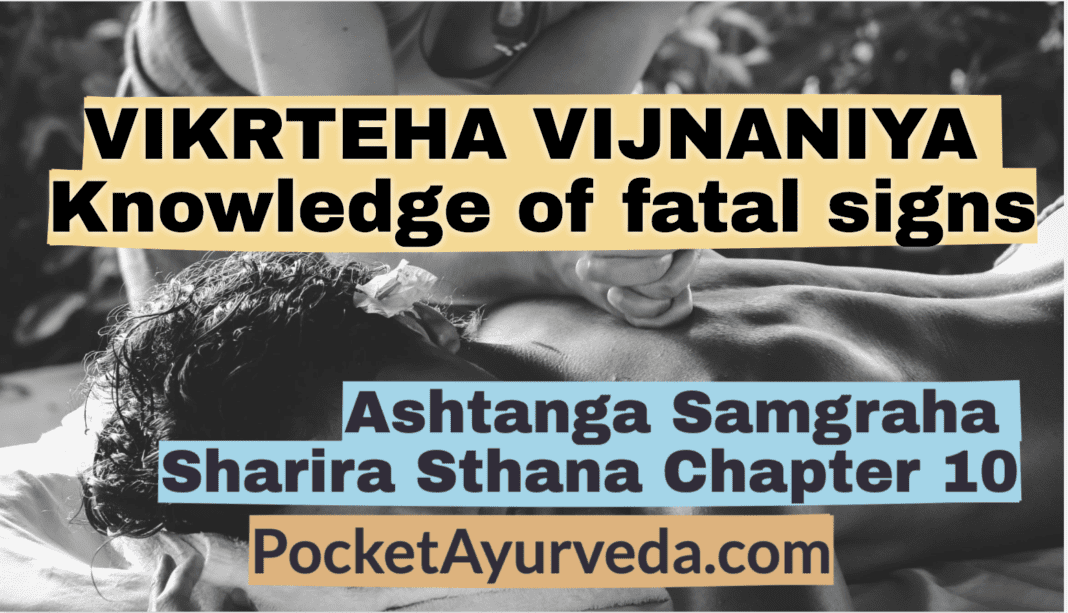We will expound Ashtanga Sangraha Sharira sthana Chapter 10 – Vikrteha vijnaniya – knowledge of abnormal activities of the body-fatal signs; thus said atreya and other great sages. (1)
अथातो विकृतेहाविज्ञानीयमध्यायं व्याख्यास्यामः । इति ह स्माहुरात्रेयादयो महर्षयः ॥१॥
Fatal signs, encephalopathy
घनीभूतमिवाकाशमाकाशमिव यो घनम् । अमूर्तमिव मूर्तं च मूर्तं वामूर्तवत् स्थितम् ॥ २ ॥
तेजस्व्यतेजस्तद्वच्च शुक्लं कृष्णमसच्च सत् । अनेत्ररोगश्चन्द्रं च बहुरूपमलाञ्छनम् ॥३॥
जाग्रद्रक्षांसि गन्धर्वान् प्रेतानन्यांश्च तद्विधान् । रूपं व्याकृति तद्वच्च यः पश्यति स नश्यति ॥४॥
He, who sees a hollow thing as solid one and a solid thing as hollow, a thing having a form as a formless one and a formless one as having form, a shining thing as not shining and a non – shining thing as shining, a white thing as black and vice-versa, an existing thing as non-existing and vice versa, sees the moon in different shapes and full of dirt even though not having any disease of the eyes; who sees raksasas, gandharvas, ghosts and such other forms even while awake-is going to die. (2-4)
सप्तर्षीणां समीपस्थां यो न पश्यत्यरुन्धतीम् । ध्रुवमाकाशगङ्गां वा न स पश्यति मां समाम् ॥५॥
He, who does not see the star Arundhati – situated near the saptarsis (group of seven stars), the star Dhruva (pole star) and the akashaganga (heavenly stream) does not live to see a year. (5)
मेघतोयौघनिर्घोषवीणापणववेणुजान् । शृणोत्यन्यांश्च यः शब्दानसतो न सतोऽपि वा ॥ ६ ॥ निष्पीड्य कर्णौ शृणुयान्न यो धुकधुकास्वनम् ।
He, who hears the sound of the clouds, waterfall, notes of the vina (lute) Panava (cymbal) and venu (flute) or such other sounds differently or whether actually present or not; who does not hear the ‘dugdugh’ sound inside his own ears when the orifices of the ears are closed tight ( is going to die soon). (6)
तद्वद्गन्धरसस्पर्शान्मन्यते यो विपर्ययात् ॥७॥
सर्वशो वा न यो यश्च दीपगन्धं न जिघ्नति । विधिना यस्य दोषाय स्वास्थ्यायाविधिना रसाः ॥८॥
Similarly in respect of the smell, taste and touch; he who understands them in their opposite way, or not understand them at all, and he who cannot understand the smell of a burning lamp ( is going to die soon) (7)
Not understanding the tastes (as described in the texts) and understanding them differently, are suggestive of ill-health and health respectively. (8)
यः पांसुनेव कीर्णाङ्गो योऽङ्गे घातं न वेत्ति वा ॥९॥
अन्तरेण तपस्तीव्रं योगं वा विधिपूर्वकम् । जानात्यतीन्द्रियं यश्च तेषां मरणमादिशेत् ॥१०॥
He, whose body appears as full of (covered with) sand, he who does not understand injury to his body parts, he who without indulging in severe penances or practice of yoga as per procedures, yet understands things beyond his sensory capacity, is going to die soon. (9-10)
जिह्वा श्यावा मुखं पूति सव्यमक्षि निमज्जति । खगा वा मूर्ध्नि लीयन्ते यस्य तं परिवर्जयेत् ॥११॥
He, whose tongue has turned black, mouth emits foul odour, the left eye is dropping down or birds alight on his head should be abandoned. ( 11 )
निकषन्निव यः पादौच्युतां सः परिसर्पति । हीयते बलतः शश्वद्योऽन्नमश्नन् हितं बहु ॥ १२ ॥ योल्पाशी बहुविण्मूत्रो बह्वाशी चाल्पमूत्रविट् । यो वाल्पाशी कफेनार्तो दीर्घं श्वसिति चेष्टते ॥१३॥ दीर्घमुच्छ्वस्य यो ह्रस्वं निश्वस्य परिताम्यति । ह्रस्वं च यः प्रश्वसिति व्याविद्धं स्पन्दते भृशम् ॥१४॥ शिरो विक्षिपते कृच्छ्राद्योञ्चयित्वा प्रपाणिकौ । यो ललाटात्स्त्रुतस्वेदः श्लथसन्धानबन्धनः ॥१५॥ उत्थाप्यमानः सम्मुह्येद्यो बली दुर्बलोऽपि वा । उत्थान एव स्वपिति यः पादौ विकरोति च ॥१६॥ शयनासनकुड्यादेः योऽसदेव जिघृक्षति । अहास्यहासी सम्मुह्यन् यो लेढि दशनच्छदौ ॥१७॥ उत्तरोष्ठं परिलिहन् फूत्कारांश्च करोति यः । यमभिद्रवति छाया कृष्णा पीतारुणापि वा ॥१८॥ भिषग्भेषजपानान्नगुरुमित्रद्विषश्च ये । वशगाः सर्व एवैते विज्ञेयाः समवर्तिनः ॥१९॥
He, who drags his legs or rubs them together (while walking) and crawls with his shoulders droping down; who loses his strength though eating healthy and liked foods in large quantities; who eats very little and eliminate large quantities of urine and faeces and he who eats large quantitites of food and eliminates very little of urine and faeces; he who eats less but troubled by (increase of) kapha, associated with long breathing and other functions; he who has a long expiration and very short inspiration and becomes unconscious; he who has shallow respirations, accompanied with severe pain and tremors (throbbing or movement of the chest) and tosses the head with difficulty supported with flexed hands; he who has profuse sweating on his forehead, looseness of all the joints;he who loses consciousness while getting up whether he is strong or weak; he who sinks down folding the legs while getting up; he who holds the bed, chair or wall though they are not present; he who laughs at unlaughable ( things, places or time); who fondly licks the lips, makes whistling sound while licking the upper lip; he, towards whom, shadows which are black, yellow or crimson come quickly; he who hates the (presence of) physician, medicines, drinks, foods, preceptors ( elders) and friends, to whom all the above are obedient-is to be understood as being in level (with death). (1219).
ग्रीवाललाटहृदयं यस्य स्विद्यति शीतलम् । उष्णोऽपरः प्रदेशश्च शरणं तस्य देवताः ॥२०॥
To him, whose neck, forehead and heart (region) bring out large quantity of cold sweat,while all the other parts of the body remain hot, gods only are the protectors. ( 20 ) योऽणुज्योतिरनेकाग्रो दुश्छायो दुर्मनाः सदा । बलिं बलिभुजो यस्य प्रणीतं नोपभुञ्जते ॥ २१ ॥
निर्निमित्तं च यो मेधां शोभामुपचयं श्रियम् । प्राप्नोत्यतो वा विभ्रंशं स प्राप्नोति यमक्षयम् ॥२२॥
He, who has an atom of brilliance (intellect ) but has many points ( unsteady), whose complexion has gone bad and who always thinks of bad things; he whose offerings of food the crows do not eat, who attains great intelligence, benovalence, increase of wealth or loses all these without any apparant cause-goes to the abode of Yama, the lord of death. (21-22 )
गुणदोषमयी यस्य स्वस्थस्य व्याधितस्य वा । यात्यन्यथात्वं प्रकृतिः षण्मासान्न स जीवति ॥ २३ ॥
The good or bad qualitites or characteristics of either a healthy man or an unhealthy man which undergo change into their opposites (without any apparant reason)-does not survive for six months. (23)
भक्ति शीलं स्मृतिस्त्यागो बुद्धिर्बलमहेतुकम् । षडेतानि निवर्तन्ते षड्भिर्मासैर्मरिष्यतः ॥२४॥
these six Devotion, chastity, memory, sacrificing, intellegence, and strength getting away from any person, is indicative of his death within six months. ( 24 )
मत्तवद्गतिवाक्कम्पमोहा मासान्मरिष्यतः । नश्यत्यजानन् षडहात् केशलुञ्चनवेदनाम् ॥ २५ ॥ ‘न याति यस्य चाहारः कण्ठं कण्ठामयादृते । प्रेष्याः प्रतीपतां यान्ति प्रेताकृतिरुदीर्यते ॥२६॥
He, who has his gait, speech, and toxicity, similar to one who is intoxicated with alcoholic drinks, is going to die in a month; he who pulls out his hair by hand, who suffers severe pain, who is unable to swallow his food though not having any diseases of the throat, whose attendants become disobedient, who develops features of a dead body quickly,. (25-26)
यस्य निद्रा भवेन्नित्या नैव वा न स जीवति । वक्त्रमापूर्यतेऽश्रूणां स्विद्यतश्चरणौ भृशम् ॥२७॥ · चक्षुश्चाकुलतां याति यमराज्यं गमिष्यतः । यैः पुरा रमते भावैररतिस्तैर्न जीवति ॥ २८ ॥
He, who sleeps always or does not sleep at all-does not live long; he whose face becomes covered with tears, legs perspire profusely, eyes become very dirty, goes to the kingdom of Yama (death). He who develops hatredness in factors which he used to like very much previously-does not survive. (27-28).
कथयेन्न च पृष्टोऽपि दुःश्रवं मरणं भिषक् । गतासोर्बन्धुमित्राणां न चेच्छेत्तं चिकित्सितुम् ॥ २९॥ यमदूतपिशाचाद्यैर्यत् परासुरुपास्यते । वद्भिरौषधवीर्याणि तस्मात्तं परिवर्जयेत् ॥३०॥
The physician should not tell the impending death to the relatives or friends though asked by them; nor express his desire to treat a person who is sure to die, because the dieing man will be in the company of attendants of death, who destroy the potency (effect) of the drugs;so such a person should be refused (treatment). (29-30).
अरिष्टं नास्ति मरणं दृष्टरिष्टं च जीवितम् । अरिष्टे रिष्टविज्ञानं न च रिष्टेऽप्यनैपुणात् ॥३१॥ चरकस्येति वचनं
Death does not occur without the appearance of rista (fatal signs) and life will not be there once the fatal signs manifest.”It is possible that the physician might mistake the non-fatal signs as fatal ones by his inexperiance but he can never mistake fatal signs for any other”-thus says Charaka. (31).
सुश्रुतेन तु पठ्यते । ध्रुवं हि रिष्टे मरणं ब्राह्मणैस्तत् किलामलैः ॥३२॥ रसायनतपोदानतत्परैश्च निवार्यते । कृष्णात्रेयो द्विधा रिष्टं स्थिरास्थिरविभेदतः ॥३३॥
Susruta also states “once the fatal signs appear, death is certain; even then it can be removed (prevented) sometimes, by brahamanas who are pure, by those who are engaged with the use of rejuvinators ( drugs, therapies or activities) penances, charity (gifts) etc. Krsna Atreya has divided the fatal signs into two kinds-stable (permanent) and unstable ( temporary ) . ( 32-33).
दोषणामपि बाहुल्याद्रिष्टाभासः समुद्भवेत् । तद्दोषाणां शमे शाम्येत्स्थाय्यवश्यं तु मृत्यवे ||३४||
From the predominance of the doshas, sometimes, Ristabhasa-pseudo-fatal signs may develop, they disappear if the doshas subside and do not necessarily indicate death. (34).
आयुर्वेदफलं कृत्स्त्रं यदायुर्ज्ञे प्रतिष्ठितम् । रिष्टज्ञानादृतस्तस्मात्सर्वदैव भवेद्भिषक् ॥ ३५ ॥ The fruit (aim, result, purpose) of Ayurveda (that is maintaince of life) depends on a (good) knowledge of (sign of) life; hence the physician should never be without having a good knowledge of fatal signs. (35).
॥ इति दशमोऽध्यायः ॥
Thus ends Ashtanga Sangraha Sharira Sthana chapter 10.




